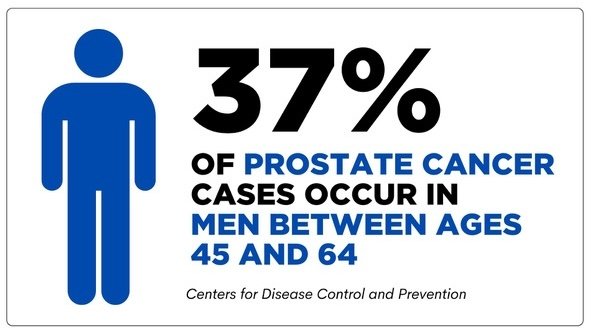
September 03, 2024
During September’s Prostate Cancer Awareness Month, MidLantic Urology is reminding men of a critical point. It's 0.75. If your PSA increases by 0.75 in 1 year, it could be prostate cancer, and it’s essential to see a urologist.
Gregory C. McMahon, D.O.
High levels of PSA do not always mean cancer. And normal levels of PSA do not guarantee cancer is not present.
“What’s crucial for men is having a baseline. Know your normal PSA level and have it tested annually – or more often if your doctor recommends – so you are alerted to any unusual changes. Finding and treating prostate cancer early, when treatment might be more effective, saves lives,” said Dr. McMahon.
Both noncancerous and cancerous prostate cells make PSA, but cancerous cells tend to produce more: the PSA blood test measures and screens for this. A PSA test, along with a digital rectal exam, remains the best way to detect prostate cancer.
Your primary care physician, or any of MidLantic Urology’s 60+ physicians, can provide a PSA test and digital rectal exam.
All of MidLantic Urology’s 60+ physicians can treat prostate cancer in its early stages. These physicians are located throughout Philadelphia and surrounding counties, in a community near you. Call the office that’s most convenient to you for an appointment.
Ten urologists and 11 advanced practice providers from MidLantic Urology have and continue to receive special training in the latest techniques to treat advanced prostate cancer (when prostate cancer spreads beyond the prostate gland and into other parts of the body). This team works together on each patient’s behalf, routinely collaborating to ensure every patient’s treatment plan is comprehensive and right for them.
Prostate cancer is not an old man’s disease as many people think. Prostate cancer is any man’s disease. And the first step to ruling out any chance of developing it is by getting tested for the disease early, in some cases even before you’re 50.
Nearly four in 10 prostate cancer cases are diagnosed in men younger than 65, and some are much younger. In fact, 37% of prostate cancer cases occur in men between ages 45 and 64, the Centers for Disease Control and Prevention reported in May 2024.
This is why you should consider scheduling your first prostate cancer screening at 40 or 45, especially if you have any of these risk factors:
• Race – African American men are more likely to develop prostate cancer than any other race, and at a younger age. African American men are twice as likely to die from the disease than other men.
• Family members – Men with fathers and/or brothers diagnosed with prostate cancer have a higher risk of the disease.
• Lifestyle factors – Obesity, smoking, and eating a high ratio of fatty foods (even if you’re not obese) increase the chance of abnormal cell development, which can become cancerous.
Whether your risk is high or not, don’t put off the PSA test. All men are at risk for prostate cancer. Out of every 100 American men, about 13 will get prostate cancer during their lifetime, and about 2 to 3 of those men will die from prostate cancer, reports the Centers for Disease Control.
Your primary care physician, or any of MidLantic Urology’s 60+ physicians in the Philadelphia region, can provide a PSA test and digital rectal exam.
On Sunday, September 29, MidLantic Urology and ZERO® Prostate Cancer will host the ZERO Prostate Cancer Run/Walk at Wilson Farm Park in Wayne, Pennsylvania. If you are interested in running, walking, or donating, visit support.zerocancer.org.

